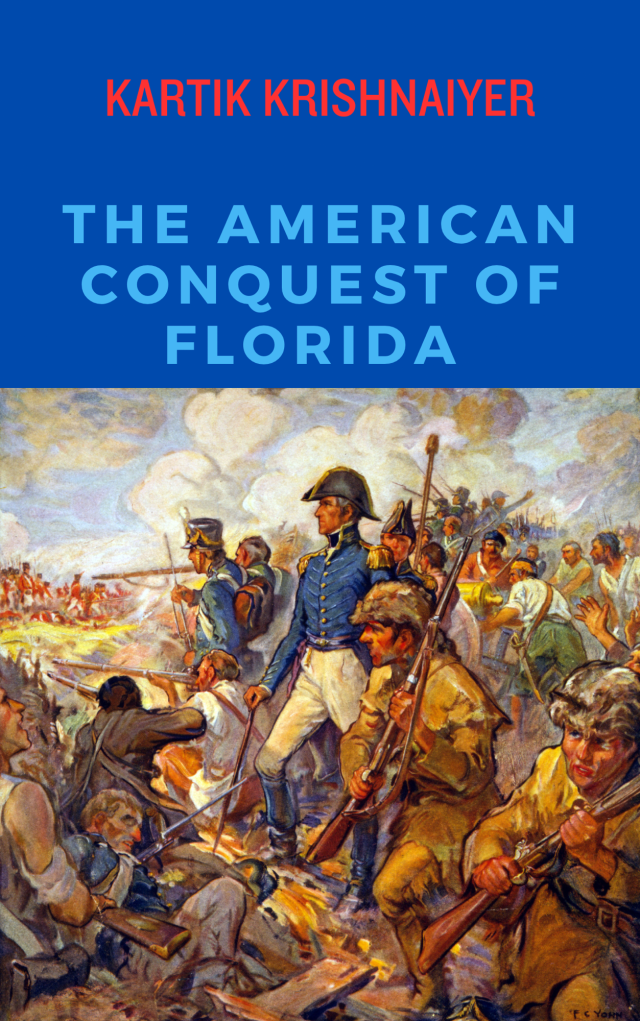
In 2016, I penned the afterward to Robert Buccellato’s excellent Florida History timepiece, Finding Dan McCarty focusing on the Governorship of Leroy Collins, who took the unfulfilled McCarty mantle and promise, and made Florida a modern state.
I have in the past focused much my analysis on Collins’ views toward improving Florida’s business climate and had long chalked off his courage in opposing hard-edged racism which was prevalent in neighboring states and among the vast majority of Florida legislators as a more conservative and pro-business position.
After all conservative businessmen in the south who had a global view wisely realized the image of their home region was prohibitive to integrating fully in the American economy. Collins careful cultivation of growing southeast Florida against populist and pork chopper instincts in the rest of the state allowed him to help change Florida’s image and improve prospects for northern businessmen to invest in the state.
Collins was even on the cover of Time Magazine, and had convinced Howard Hughes to invest heavily in developing an aerospace campus in Miami, but that eventually fell through. Identification of who was “liberal” and who was “conservative” by political writers has often focused primarily on the race issue when it came to Florida – but I had long felt Collins instincts weren’t born out of liberalism but practical moderation and his strong sense of right and wrong thanks to religion.
Collins’ finest moment as Governor was delivered on May 2, 1957 when he vetoed the legislature’s resolution of “Interposition,” which would have essentially allowed Florida to defy US Supreme Court rulings (and in the future perhaps the Civil Rights Act of 1957 which was passed in a watered-down form and signed by President Eisenhower the midst of the Little Rock crisis )
“This concurrent resolution of ‘Interposition’ crosses the Governor’s desk as a matter of routine. I have no authority to veto it. I take this means however to advise the student of government, who may examine this document in the archives of the state in the years to come, that the Governor of Florida expressed open and vigorous opposition thereto. I feel that the U. S. Supreme Court has improperly usurped powers reserved to the states under the constitution. I have joined in protesting such and in seeking legal means of avoidance. But if this resolution declaring the decisions of the court to be ‘null and void’ is to be taken seriously, it is anarchy and rebellion against the nation which must remain ‘indivisible under God’ if it is to survive. Not only will I not condone ‘interposition’ as so many have sought me to do, I decry it as an evil thing, whipped up by the demagogues and carried on the hot and erratic winds of passion, prejudice, and hysteria. If history judges me right this day, I want it known that I did my best to avert this blot. If I am judged wrong, then here in my own handwriting and over my signature is the proof of guilt to support my conviction.” – – LeRoy Collins, Governor.” May 2, 1957.
But it seems a major part of Collins’ legacy that I had overlooked came after he left the Governor’s office. I had read Martin Dyckman’s seminal work Floridian of His Century: The Courage of Governor LeRoy Collins (Florida History and Culture) in 2007, but reread it on my Kindle in the last two weeks and found it fresher and more revealing/timely than when first published. Collins may have been motivated by his conservative pro-business instincts but his sense or right and wrong was unlike so many others in the south at the time.
Following his departure as Governor where he was succeeded by the less moderate Farris Bryant (instead of the more reasonable Doyle Carlton Jr.) and Florida slipped back into a more aggressive defense of segregation laws and denial of African-American voting rights. Governor Bryant took a leadership role among Southern Governors in trying to hold the line against Civil Rights laws. The below clip is from Bryant’s testimony in front of the US Senate on Civil Rights.
Unlike Bryant a regional and parochial figure, Collins courageous stands made him a commodity on the national level. The National Association of Broadcasters hired Collins and he and the family relocated to Washington. After passage of the Civil Rights Act of 1964, he was appointed by President Lyndon B. Johnson as the first Director of the Community Relations Service under the 1964 Civil Rights Act. After Selma, he became Under Secretary of Commerce.
Collins’ was seen by many southerners as a traitor to his region. But you can judge the quality of a man by his enemies – no enemy better than Senator James Eastland (D-Mississippi) the arch-racist (Eastland was more than a segregationist. He genuinely disliked any contact with African-Americans) who lobbied LBJ hard against appointing Collins. Dyckman tells the story:
Collins would never know that he had not been the president’s first or even second choice. James Eastland objected strenuously, however, during a conversation with the president about the disappearance of three civil rights workers in Mississippi. (It would turn out that the Ku Klux Klan had murdered them, but Eastland dismissed it at the time as a publicity stunt.) Unaware that Johnson taped his telephone calls, Eastland exploded at the mention of Collins’s name: “He’s a damned cheap double-crosser and a liar and he’s strictly dishonest. Now he agreed at the convention to recognize us to vote for you and he went back on his word. I called him a goddamned, lying son of a bitch out there.” “Well, we don’t want him then, do we?” the president replied. “Hell, no!” said Eastland

Collins first real test as Community Relations Service was at Selma. Unfortunately, the 50th Anniversary commemorations of Bloody Sunday and the Selma to Montgomery March in 2015 didn’t give Collins his due. But he was critical to keeping the peace as best as it could be kept and making things work. He paid an awful political price for it. Again Dyckman:
The march was in its second day. Collins parked his car beside U.S. 80, found King and his associates at the head of the column, and walked with them while they discussed the details. With some apprehension, Collins noted a truckload of photographers taking pictures. The Associated Press photograph, as printed by his hometown newspaper and many others on March 23, showed Collins talking with the Rev. Andrew Young, with Dr. King, Mrs. King, and the Rev. Ralph Abernathy walking alongside them (see fig. 10). The caption reported that Collins “joined civil rights demonstrators staging a 54-mile protest march from Selma, Ala., to the state capitol at Montgomery.” Though the text identified him as “President Johnson’s representative on racial problems” and said that he walked only “about a mile” with the marchers, the absence of a full explanation made it appear that he had joined them by choice.42 Mary Call had returned to Tallahassee for the expected birth of a grandchild. She warned Collins by telephone of an intensely hostile community reaction to the photograph. Arriving at the Tallahassee airport late that night, Collins found no taxi and called the Grove to ask his wife to pick him up.
Collins never recovered politically. In 1968 he ran for US Senate and was hounded because of his courageous record. Collins was eventually defeated by Ed Gurney, a clownish figure who became the first Republican US Senator from our state since the Reconstruction era.
Before Collins faced Gurney in the General Election he was almost beaten for the Democratic nomination by Attorney General Earl Faircloth. A Miamian, Faircloth had ties to liberal former US-Senator and then-US Congressman Claude Pepper, but his campaign emulated the tactics of George Smathers who held the seat and was retiring from the US Senate. In fact Smathers, a close friend of Richard Nixon (who introduced Nixon to Key Biscayne real estate) reconsidered his retirement to try and stop Collins from being elected. While Faircloth wasn’t as overt in his attacks on Collins as Smathers and his allies had been against Pepper in 1950, Faircloth was still race-baiting and in Collins faced a candidate whose psychology was different than the fighting Pepper.
But in the end conservative Democrats got behind Faircloth whose pandering to conservative interests and race baiting went along with the times. Collins from the beginning new he was up against it as even some old friends abandoned him because of his racial liberalism. Collins tried to placate primary voters running to the middle and still found himself unsatisfactory to conservative and reactionary interests in a state which dominated much of the Democratic Party. Collins in the runoff began pushing left again and in the General, perhaps liberated by knowing he would lose ran one of the most uplifting and liberal campaigns on social issues we’ve seen from a statewide candidate. Still in a state where Democrats hadn’t lost a US Senate race in nearly a hundred years, Collins lost by double-digits as noted above.
Collins was one of the greatest Floridians of the 20th Century. His leadership contributed mightily to Florida not falling into the trap of the five Deep South states(Georgia, Alabama, Mississippi, Louisiana and South Carolina) states who at various times had such demagogic leadership about race that northern businesses stayed far away from those states. In the 1970’s, when Florida emerged as a leading progressive light in the Sun Belt and a “Golden Age” of politics emerged, it was thanks in large part of the vision and courage Collins had exhibited in the 1950’s and 1960’s. Collins electoral career ended in 1968, but his contributions to the state continue to this day.
Thankfully, just two years later, in 1970 the racial backlash would end and Florida would elect statewide for the first time two of the greatest men to ever hold public office in the state- Reubin Askew and Lawton Chiles. The 1970’s would be the apex of political enlightenment in the state of Florida. Leroy Collins as much as any man had a role in making that happen.
Ed Gurney for his part ended up becoming a disgrace to the state and one of many single-term statewide elected officeholders. No Republican in Florida was reelected in a statewide election until 1994 – Gurney worked with Governor Claude Kirk to oppose William Cramer’s candidacy in 1970 for US Senate creating an irrevocable split within Florida’s minority party. Then Gurney was indicted in 1974 for influence peddling just months after he had been Richard Nixon’s only staunch defender on the Senate Watergate Committee – while the other Republicans on the Ervin panel had tried to be objective and eventually tilted against the President Gurney was Nixon’s leading man in the Senate. Gurney did not seek reelection and was eventually acquitted on all charges. Collins died in 1991 and Gurney passed away in 1996.







Yes, this was a real turning point in Florida politics, especially 1970. As soon as the new constitution got rid of the Pork Chop Gang, thus giving South Florida more clout, the writing was on the wall. However, I don’t know how many people know how close Askew was from not being governor. What if Mathews would have finished 2nd in the primary? It would have been ugly, and Florida might have taken less time to progress.
LikeLike
This Cloud
LikeLike